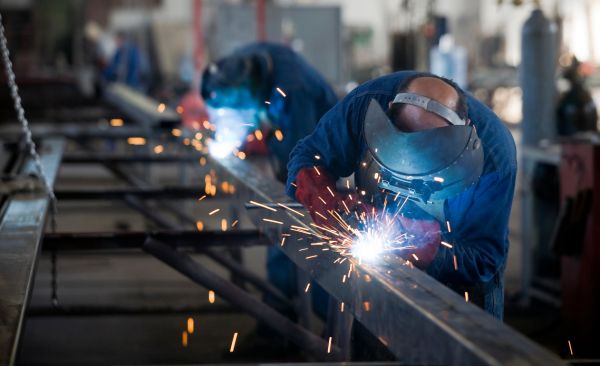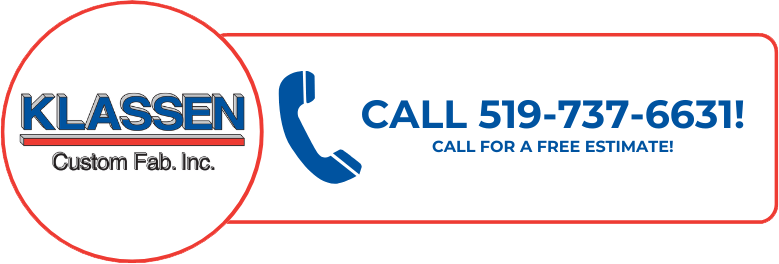Understanding Fabrication Quality Certifications in Ontario
c protect your investment and ensure project success. These certifications prove that metal fabrication companies follow strict safety and performance standards. Klassen Custom Fabricating Inc. holds ISO 9001 certification and meets multiple industry requirements, delivering fabrication quality that exceeds expectations on every project.
ISO 9001: Your Quality Assurance Guarantee
ISO 9001 certification means a company follows proven quality management practices. This international quality standards framework requires documented processes for every step of production. Certified companies must track results, implement continuous improvement practices, and fix problems quickly.
External auditors visit certified facilities regularly. They check documentation, interview workers, and watch production processes. Companies must prove they plan for quality, manage resources properly, and measure customer satisfaction. The standard prevents problems instead of just finding them after they happen.
ISO 9001 certified shops keep detailed records of materials and processes. You can trace every part back to its source through proper data collection systems. When issues arise, certified companies find the cause fast and fix it permanently. This systematic problem-solving approach reduces defects and delivers better results.
Klassen Custom Fabricating Inc. uses ISO 9001 systems to ensure consistent quality across all projects. Their documentation tracks every detail from initial engineering drawings through final delivery, supported by ongoing training courses for staff development.
Canadian Welding Bureau Standards
The Canadian Welding Bureau sets welding standards for industrial work across Canada. CWB certification ensures welding processes meet national safety requirements. This covers welding processes, materials, and worker skills through comprehensive evaluation.
CWB standards apply to different projects including structural steel, pressure vessels, and custom components. Each type needs specific procedures and tests. Certified welders pass both practical and written exams after completing required courses. Companies maintain records of welder qualifications and procedure compliance.
Quality control includes testing before, during, and after welding. Non-destructive testing finds internal flaws without damaging the finished work. These tests catch problems that could cause safety issues or structural failure. Many metal fabricator operations also develop apprentice programs to train the next generation of skilled welders.
CSA Standards for Electrical Safety
CSA Group creates safety standards for electrical equipment sold in Canada. CSA certification is required for electrical enclosures installed in Canadian facilities. These standards protect equipment and people from electrical dangers through rigorous testing protocols.
The certification process examines design, materials, and manufacturing methods. CSA standards set minimum requirements for:
- Protection from electrical shock and fire
- Resistance to moisture, temperature, and weather
- Mechanical strength and impact resistance
- Proper grounding and electrical connections
Manufacturers send prototype enclosures to CSA labs for testing. Tests include electrical safety checks, environmental exposure, and mechanical stress evaluation. Products must pass all tests to receive CSA certification marks. Many metal fabricator companies invest in specialized courses to understand these complex requirements better.
UL Certification for US Markets
Underwriters Laboratories standards provide safety certification for US markets. Ontario fabricators often get UL certification to serve North American customers. UL standards work with CSA requirements but include specific US regulations.
UL certification requires complete product testing and factory inspections. Standards examine potential hazards during normal use and failure conditions. UL certified products display marks that show safety compliance. The certification process often involves automation systems to ensure consistent testing procedures.
Ontario Regulatory Requirements
Ontario has specific rules for industrial fabrication work. The Technical Standards and Safety Authority oversees pressure vessel work. Companies building boilers and pressure vessels must register with TSSA and maintain current safety courses for their workforce.
Workers’ compensation rules require safe working conditions. Companies must train workers, identify hazards, and prevent accidents. Breaking these rules leads to penalties and work shutdowns. Many employers partner with apprentice training programs to develop skilled workers who understand safety requirements.
Environmental rules control emissions, waste, and chemical use. Fabrication shops need permits for painting, waste disposal, and air emissions. Regular reports and inspections ensure ongoing compliance.
How Quality Control Works
Certified shops use systematic quality control from start to finish. The process begins with incoming material inspection and continues through final delivery. Quality checkpoints catch problems early through careful metrology practices and measurement verification.
Material certificates prove raw materials meet specifications. Certified suppliers provide test reports showing chemical content and mechanical properties. Incoming inspection confirms delivered materials match certificates and engineering drawings specifications.
Work instructions specify exact procedures for each step. Instructions include welding settings, machining specs, and assembly order. Workers get training on proper procedures and quality requirements through regular skills courses.
Inspectors check work at set points during production. They verify dimensions, surface finish, and assembly accuracy against engineering drawings. Non-conforming work gets separated for correction. Final inspection confirms finished products meet all requirements.
Why Choose Certified Fabricators
Certified fabricators offer clear advantages over non-certified competitors. Quality systems reduce defect risk and project delays through Total Quality Management principles. Standard processes deliver consistent results across all projects.
Documentation creates clear communication between customers and fabricators. Detailed specifications prevent confusion about quality requirements. Change procedures manage modifications while keeping quality standards.
Improvement requirements push certified companies to enhance capabilities. Regular reviews find opportunities for better processes and lower costs. Customer feedback helps quality systems address real performance needs. A qualified metal fabricator uses these systems to maintain competitive advantages.
Overcoming Certification Challenges
Getting certifications requires investment in systems and training. Small shops may struggle with documentation and audit preparation. Staff changes can disrupt procedures and need retraining through refresher courses.
Keeping certifications current needs attention to standard updates and regulation changes. New technology may require procedure changes and additional training. Cost pressure sometimes conflicts with quality system needs.
Certified companies typically recover investment through better efficiency and less rework. Good quality control prevents expensive mistakes and unhappy customers. Access to bigger projects often justifies certification costs. Many successful metal fabricator businesses also invest in their workforce development through ongoing professional courses.
Choosing Your Fabrication Partner
Project specifications should list required certifications and standards. Different applications need specific certifications or approvals. Early identification prevents delays and qualification problems.
Check fabricator certifications and audit results during evaluation. Site visits confirm quality systems work in practice. References from past customers show actual performance and quality delivery.
Look for fabricators who explain their quality processes clearly. Good certified shops welcome questions about their systems and procedures. They should provide documentation that proves their capabilities and show evidence of their welding processes expertise.
Working with Certified Excellence
Understanding fabrication quality certifications helps you choose the right partner for your project. These standards ensure work meets safety, performance, and regulatory requirements. Klassen Custom Fabricating Inc. combines ISO 9001 certification with proven expertise to deliver superior fabrication quality that protects your investment and ensures project success.
The post Understanding Fabrication Quality Certifications in Ontario appeared first on Klassen Custom Fabrication.
from Blog - Klassen Custom Fabrication https://klassenfab.com/fabrication-quality-certifications-in-ontario/?utm_source=rss&utm_medium=rss&utm_campaign=fabrication-quality-certifications-in-ontario
via Klassen Custom Fabricating Inc.


This is a very informative post and highlights an important topic within the manufacturing sector. From an SEO and industry perspective, investing in the right Stainless steel fabrication machinery
ReplyDeleteis essential for improving efficiency, accuracy, and long-term profitability. Many UK businesses are now focusing on upgrading their production lines to stay competitive and meet higher quality standards. Working with trusted providers such as Stainless steel equipment can make a significant difference, as reliable machinery reduces downtime and ensures consistent results. Overall, combining quality equipment with smart digital visibility is a strong strategy for sustainable growth in today’s market.